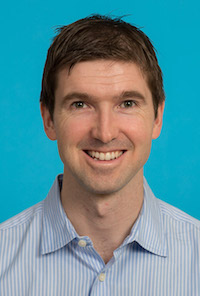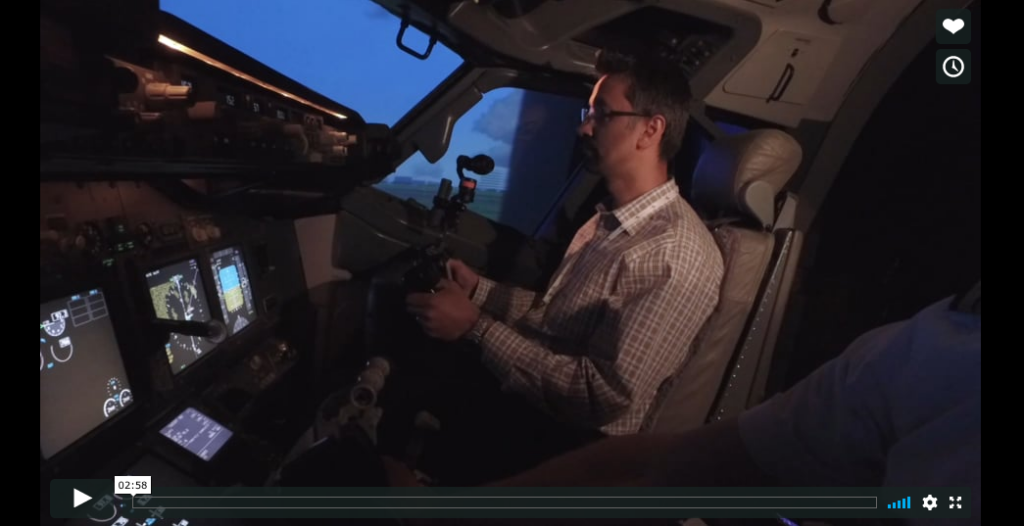The Forum is a unique event that highlights applications of simulation to advance patient safety and quality improvement efforts.
The day before the 2018 National Forum, SIM-one/CNSH was honoured to partner with CAE Healthcare to bring the unique CAE OnBoard experience to North America for the first time – bringing healthcare leaders into the cockpit to learn about safety, reliability and simulation in aviation.
Program
The 2018 Forum featured an incredible array of presentations on innovative uses of simulation to meaningfully advance safety and quality! Click here to view our official program.
Agenda
| 08:00 | Registration & breakfast |
| 08:30 | Welcome |
| 09:00 | Keynote: Dr. Andrew Petrosoniak |
| 10:15 | Case studies & impacts – Rapid-fire panel then an hour of discussion and networking |
| 12:30 | Lunch |
| 13:30 | Workshops |
| 15:00 | Structured networking |
| 15:45 | Q&A panel: Frugal SIM |
| 16:30 | Final remarks |
Keynote: Safer Care, One Simulation at a Time Innovative Opportunities for Quality Improvement
A Vision For a Fully Integrated Simulation + Quality/Safety Program
Dr. Andrew Petrosoniak presented a vision for a quality and safety program that fully integrates simulation to achieve high reliability – using multiple modalities in multiple ways to improve teamwork, processes, spaces, workflow and patient outcomes. Dr. Petrosoniak’s presentation slides can be found here.

Dr. Petrosoniak is an emergency physician and trauma team leader at St. Michael’s Hospital. He’s an assistant professor at the University of Toronto and an associate scientist at the Li Ka Shing Knowledge Institute. His research work focuses on using in situ simulation to improve patient safety and optimizing skill acquisition of rarely performed procedures. More recently, he’s applying simulation to inform design within newly constructed clinical environments. His publications include work on using in situ simulation in emergency medicine and trauma care. He’s an invited speaker at both national and international conferences on topics related to acute trauma resuscitation and in situ simulation. More >
Case Studies & Impacts
This session highlighted ways simulation is being used by Canadian healthcare agencies to achieve meaningful improvements in care quality and patient safety. Ten dynamic, rapid-fire panel presentations summarizing each project were followed by networking time to meet the presenters and learn more about their achievements and secrets of their success.
| Simulation and IPE: Is it worth the cost and effort? | Alison Fox-Robichaud; McMaster University |
| Medical Assistance In Dying (MAiD): A community simulation | Darin Abbey; Centre for Interprofessional Clinical Simulation Learning, Royal Jubilee Hospital |
| Investing Wisely – Working With Volunteers to Establish a High Quality SP Program | Lisa Sokoloff and Cathy Smith; Baycrest Health Sciences |
| Supporting Rural and Remote Hospitals to Conduct Regular In-Situ Simulations for Sustainable IPE: The use of TeleSIM and beyond… | Jaime Gallaher; Vancouver Coastal Health |
| Simulation to inform procurement decisions | Anjum Chagpar; Healthcare Human Factors, University Health Network |
| You can escape, but did you learn? Using escape rooms to measure knowledge and increase awareness | Cynthia Welton, Gemma Styling, Sean Sia, Erika Petersen; Trillium Health Partners |
| Getting a Bang for your Buck: Simulation to improve day-to-day processes that impact every patient | Li Peckan; Queensway Carleton Hospital |
| Beam me up Scotty… Téléportez-moi! | Sophie Audet, Josée Berends, Patrick Jolin-Rodrigue; l’Institut du Savoir Montfort |
| Impacting Quality and Safety with Code Simulations | Agnes Ryzynski; Sunnybrook Health Sciences |
| In situ simulation debriefing: defining a role for latent safety threat identification | Sparsh Shah, Chris Hicks, Kari White, Mark Fan, Sonia Pinkney, Patricia Trbovich, Melissa McGowan, Andrew Petrosoniak; St. Michael’s Hospital |
| Simulation for Emergency Department Quality Improvement | JoAnne Slinn, Jared Baylis, Kevin Clark; Kelowna General Hospital |
| Using simulation to refine, test and maintain competence in the Code Omega protocol at MGH | Debbie Gillis, Angelina Lomoro, Laura Finley, Adrian Harrington; Michael Garron Hospital |
| MAID: An Interprofessional Simulation Experience | Sarah Branton; Humber River Hospital |
| OnBoard: A Day in the Cockpit for Healthcare Leaders | Robert Nag, Kim Cartlidge; CAE, Guillaume Tirtiaux; REPORT’in, Scotty Newell, PSA |
Q&A Panel
Frugal SIM – starting and growing a quality SIM program with limited resources.
Starting up a sim program in a hospital or other care delivery setting can be a daunting task – especially if space, financial and human resources are limited. But it is quite possible to implement good and successful simulations on a budget! In this session, experts who have creatively and frugally integrated sims responded to questions and shared their wisdom.
Workshops
We were pleased to host these 90-minute workshops for a deeper dive into critical topics.
Using Simulation to Improve Teamwork and Communication Skills: Introducing TeamSTEPPS Canada™
Tricia Swartz & Gina De Souza, Canadian Patient Safety Institute; Debbie Gillis, Toronto East Health Network
Evidence demonstrates that improving teamwork and communication skills is one of the best ways to improve patient experience and clinical outcomes. Evidence also shows that the use of simulation has proven to be a powerful strategy in improving teamwork in team-based health care. Simulation affords excellent opportunities to enhance the quality of continuing education for health care professionals, as well integrate evidence based tactics and learning into everyday practice. Join TeamSTEPPS master trainers for an experiential learning session to understand how to teach and integrate TeamSTEPPS Canada™ (a teamwork and communication curriculum), tools and resources by using simulation in the education and integration process.
Learners from this session will:
- Learn about using the TeamSTEPPS Canada™ program to address teamwork and communication issues
- Develop an understanding of how to use simulation to teach the TeamSTEPPS Canada curriculum
- Develop insights into how to integrate TeamSTEPPS tools and resources into everyday practice
Advocating simulation: Strategies and data to promote your sim program
Tim Willett, SIM-one/CNSH & Eric Lamoureux, CPSI
Simulationists and quality/safety improvement personnel often find themselves having to advocate: for the value of what they do, for resources, for funding, for space. In this unique workshop, we bring together data and skills to enhance your advocacy work. We will spend half the session on strategies and techniques for advocacy – how can you best frame your pitch to influence decision-makers – and half on key evidence to support your arguments and justify investment in simulation.
Simulation for organizational culture change
Agnes Ryzynski & Rob Burgess, Sunnybrook Health Sciences
Simulation in quality and safety is a rapidly developing best practice model. What once was an innovative concept is now becoming an essential component of quality and safety in healthcare. This workshop will highlight approaches to transform current culture, strategies to facilitate senior leadership, staff and patient support, and discuss tools for outcome measures that address accountability to ensure sustainable change. The workshop will explore emergency preparedness and code training to demonstrate the aforementioned objectives.
Fixing it for Good: Using Human Factors & Simulation to Systemically Mitigate Safety Events
Anjum Chagpar, Healthcare Human Factors, University Health Network
Despite almost 20 years of concerted effort to reduce harm, rates of preventable safety events remain stubbornly unchanged. Could this be due to the disproportionate effort placed on cause identification as opposed to intentionally designing the system to be resilient to error? Through storytelling, hands on activities and discussion, this workshop will describe how human factors concepts and tools can be used to design simulations that allow us to quantify risk and proactively design mitigations that systemically, and permanently address safety.
Venue
The 2018 National Forum was generously hosted by George Brown College at their Waterfront Campus with gorgeous views over Lake Ontario!

Sponsors & Exhibitors
We would like to thank the sponsors and exhibitors at the 2018 Forum!
- Gaumard Scientific
- Laerdal
- CAE
- Spectrum Nasco
- MED3D Network
- WeVu
Advocating Simulation to Hospital Leadership

SIM-one/CNSH and CAE Healthcare were excited to present a truly unique opportunity for healthcare administrators and decision-makers: the CAE OnBoard program – the first time offered in North America!
Twelve healthcare and hospital leaders experienced the power of simulation first-hand as they entered a flight simulator to pilot a plane and employ crew resource management, flight safety protocols, the use of checklists, and post-simulation debrief. The debrief and discussion brought this experience to the healthcare context: how to better serve clinicians, patients and their families by helping leaders to understand how aviation practices for safety and high reliability can transfer to healthcare, where they can have the most impact on patient safety.